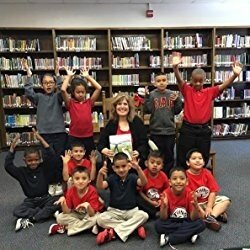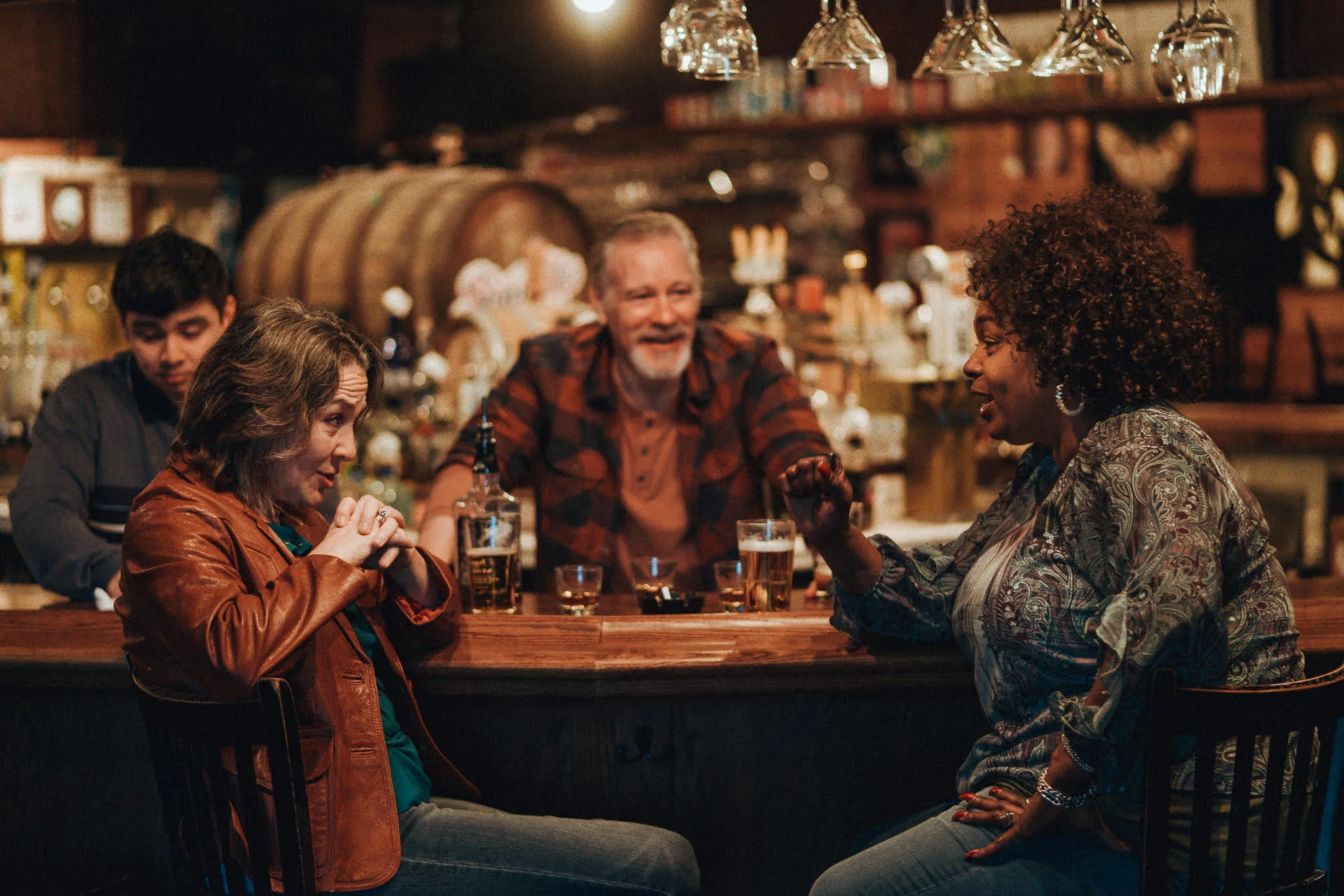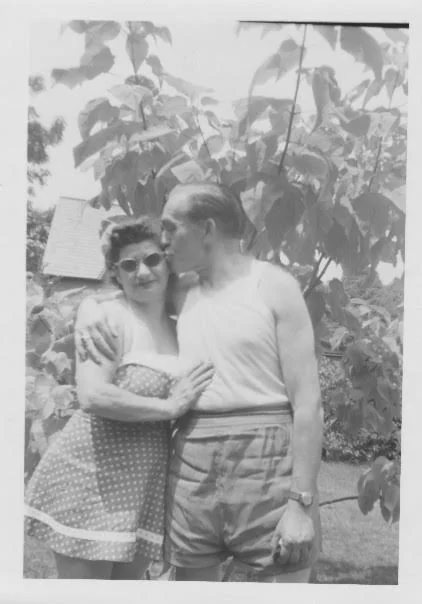For years, I’ve been living a double life.
No, I’m not a spy. Nor do I have another family stashed away in another state. In the last decade, I have been writing children’s books while reviewing and writing about theater for The Dallas Morning News. Carefully, cautiously, I’ve kept those worlds separate. Then two enormous things happened.
On Jan. 7, I was one of 43 staffers laid off at the newspaper where I’d worked proudly for 19 wonderful years. That meant I could let one world go — the world of theater criticism — and enter fully into the world of children’s books. Trust me, I thought about it.
(from l-r) Christopher Llewyn Ramirez, Sally Nystuen Vahle, Jon Shaver and Liz Mikel in Dallas Theater Center’s regional premiere of Lynn Nottage’s ‘Sweat’ at the Kalita Humphreys Theater in Dallas
Then On Jan. 23 I saw Dallas Theater Center’s regional premiere of Sweat at the Kalita Humphreys Theater and it was like the “water” moment from The Miracle Worker where the blind and deaf Helen Keller realizes for the first time that the word that her teacher, Annie Sullivan, has been spelling into her hand was not just a way to get water, but was water itself.
Just as I’m readying to release my sixth book into the world, Martin & Anne, the Kindred Spirits of Dr. Martin Luther King, Jr. and Anne Frank, the insights from DTC’s powerful production of Lynn Nottage’s 2017 Pulitzer Prize-winning play turned on a switch. Yes!
While my book for children points out the common humanity and inspiration we’ve drawn from two iconic figures of different genders, faiths, races, languages and countries, Nottage’s play reminds us how we are still living with the toxic hate, anger and hurt that stems from desperation and fear.
Dr. King and Anne Frank were both born in the same year — 1929 — the year of the worldwide depression, a year where sadly, instead of pulling together, vulnerable people looked for even more vulnerable minorities in their community to blame and hurt.
Nottage’s play, while fictional, is drawn from the deep well of interviews she did with workers in Reading, Pa., whose lives and friendships were upended by factory shutdowns, layoffs and the erosion of workers’ rights in the 2000s. It’s a time which is still very much with us.
(from l-r) Jon Shaver, Sally Nystuen Vahle, Christopher Llewyn Ramirez, Liz Mikel in 'Sweat.' Photo by Evan Michael Woods.
The play, which moved from off-Broadway in 2016 to Broadway in 2017, opens with an interrogation of an angry, tattooed young man, Jason (an explosive Kyle Igneczi), by a concerned police officer trying to control his exasperation (a resilient, patient Tyrees Allen). Like the craftsmanlike dramatist she is, Nottage shoots to flashback scenes, framing the story with tantalizing hints about a crime that will ultimately be revealed.
As the journey progresses, however, it becomes increasingly clear that there are larger crimes being committed by people we don’t see. These are the economic crimes where the well-off executives that run the factory in Sweat play financial games with workers that are barely scraping by.
In wrenching performances, Sally Nystuen Vahle and Liz Mikel. play Tracey and Cynthia, two best buds who grew up together and went straight from high school to work in the factory. Cynthia applies for a promotion to a managerial position. Tracey views managers as natural enemies of the workers. As friction sparks, racial tensions which never seemed to be in play before rise to the surface, crackling and popping as these two actresses masterfully portray a friendship that frays amid stress and suspicion.
Igneczi’s despairing Jason and Ace Anderson’s vulnerable Chris play the next generation — trying to carry on or do better than their parents while opportunity is being snatched away faster than they can comprehend what’s happening. They’re like animated characters who keep running in the air because they don’t realize they’ve run off a cliff — but the hurt is too real and familiar to be funny.
Christopher Llewyn Ramirez’s quiet, wounded Oscar, the bartender’s assistant who thinks getting a job in the factory as a way of moving up in a world of limited opportunities, fleshes out the picture as besieged workers denounce his willingness to work for less as a threat.
The revolving set by William Bloodgood serves as a reminder that the different planes where their lives play out — the bar, outside the bar, their apartments, prison — flow one into another as part of the same watery world. Projections by Shawn Duan pepper the top of the scenes with dates and news that put the stories in context of real events.
What’s important to remember is that the forces behind events have a way of repeating themselves. To quote Jackson Browne from “Lives in the Balance”: “…there's a shadow on the faces/Of the men who send the guns/To the wars that are fought in places/Where their business interest runs.”
Browne was writing about the unseen faces who press for wars that others fight. It’s an idea that applies to business wars on the domestic front. In Sweat, the wise bartender, Stan, tries to point out that instead of punching down, the workers should look up and confront those pulling the strings. He is, however, like Cassandra in The Illiad — cursed with the ability to see in a world where no one listens.
Martin & Anne is the sixth of the eight books I have sold. Each book has turned the spotlight on someone that most kids didn’t know about, someone who achieved what seemed an unlikely dream through persistence and heart, someone whose dream was not just about themselves, but made the world a better place.
They are all close to my heart, but Martin & Anne has a dedication that bleeds: “For those whose lives were cut short everywhere, including Bialystok June 27, 1941. Your memory is a blessing. Love lives on.”
My grandfather, Sam Farber (right), with my grandmother, Mary Farber. He escaped Bialystok, Poland where his mother and two of his brothers, their wives and children were killed in the Holocaust.
Among those who were herded into a synagogue in Bialystok and set on fire that day were my great grandmother, great uncles and their wives and their children, none of whom I’d ever meet in this world, but whose losses have given my mother nightmares all her life.
My relatives were not unlike the factory workers of Sweat. My grandfather fled on foot as a teen in the early 1920s to America, but others in his family didn’t have the means or access to escape when the threat of the Nazi regime rose.
The fragility of living amid scarcity is something Dr. King understood as he reached out across race and faith lines, speaking in synagogues as I wrote in my recent op ed about Martin & Anne for Religion News Service. He emphasized the need to join together in the fight for economic justice. He tried to explain that prosperity would rise from unity and could not and should not be achieved from division and discrimination.
The stock market crashed in 1929, the year in which Dr. King and Anne Frank were born, leaving people out of work, homeless and begging for bread. How different would the world have been if people who were hurting reached across the superficial lines that divide us to lift each other up? What could the human race accomplish even now, in our times, if we helped each other rather than viewing life through the cold lens of a zero sum game where one person’s advance is another person’s loss?
(from l-r) Sally Nystuen Vahle and Liz Mikel in Dallas Theater Center’s ‘Sweat.’ Photo by Evan Michael Woods.
I strongly recommend DTC’s production of Sweat, continuing through Feb. 10. It’s a cautionary reminder that instead of learning from the most heinous of crimes, the human race remains capable of destroying itself, doubling down on its mistakes again and again. Art, whether in the form of theater, books, music or visual images, offers hope to remember, to help us walk in each other’s shoes — and do better.
And that is the reason, in addition to writing children’s books, I will continue to write about theater. Like people, art is stronger together.
Want to talk about theater, books, art and why it all matters? Join me on my new Facebook group Where The Drama Is. If you want to keep the conversation focused on children’s books, please join my Facebook page Nancy Churnin Children’s Books. Or bookmark this blog where I’ll be sharing conversations with artists and what’s on my mind. I look forward to visiting with you.
Sweat continues through Feb. 10, presented by Dallas Theater Center at the Kalita Humphries Theater, 3636 Turtle Creek Blvd., Dallas. $20-$101, subject to change. DallasTheaterCenter.org. Performance reviewed was Jan. 23. Running time: 2 hours, 28 mins.
Martin & Anne, The Kindred Spirits of Dr. Martin Luther King, Jr. and Anne Frank (illustrated by Yevgenia Nayberg, published by Creston Books, distributed by Lerner Books) launch party March 10 at 2 p.m. at Interabang Books, 10720 Preston Rd., Dallas. Free. interabangbooks.com
Twitter: @nchurnin






